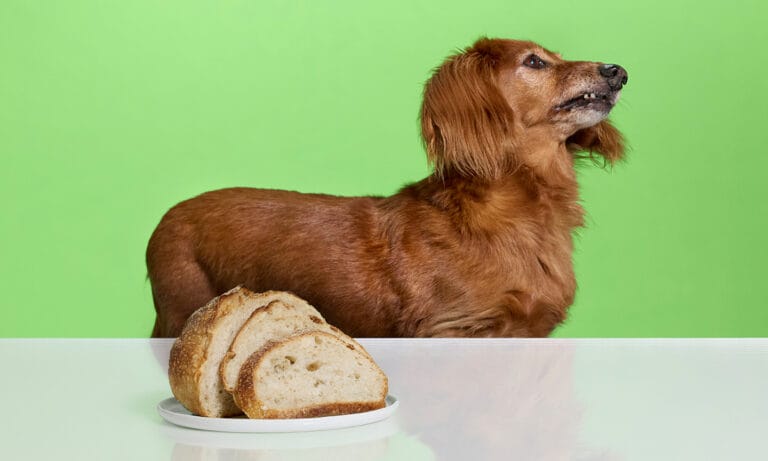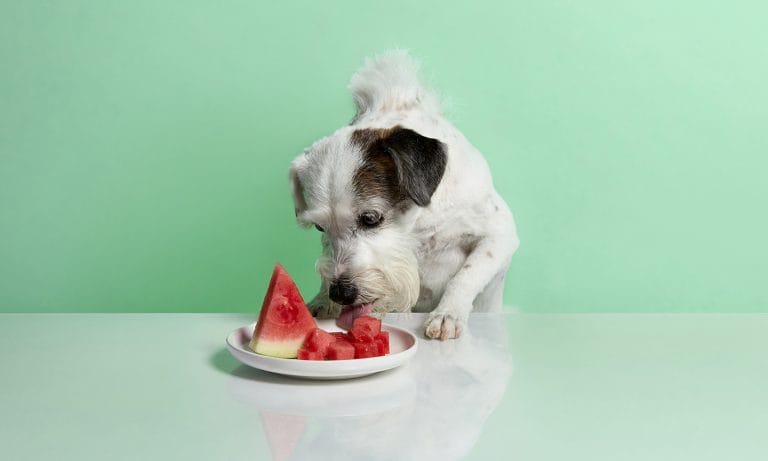It’s no secret that dogs have a near-insatiable appetite. To our canine companions, the world probably seems like one big buffet. However, just because a dog can eat something doesn’t mean they should.
While there are several human foods dogs can enjoy in moderation, it’s important to know that some common human foods can be hazardous—even lethal—to our four-legged family members.
We spoke to a vet expert to get the lowdown on which human foods dogs can’t eat—and keep out of paw’s reach.
14 Toxic Foods for Dogs
1Onions, Garlic, Chives and Leeks
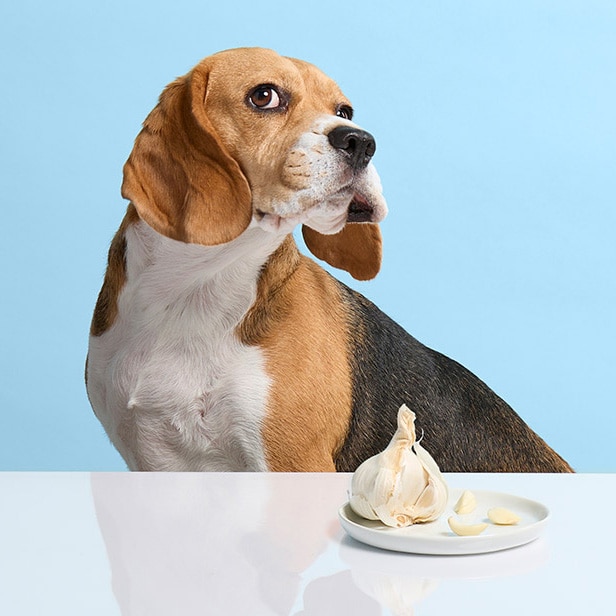
Onions, garlic, chives and leeks are kitchen staples that belong to the Allium family. They contain a compound, N-propyl disulfide, that dogs cannot properly digest.
Ingestion can damage red blood cells and lead to their destruction—a condition known as hemolytic anemia.
Symptoms of this condition may include weakness, vomiting, breathlessness and an increased heart rate.
2Xylitol
Xylitol is an artificial sweetener often found in chewing gum, sugar-free candies, certain peanut butters, toothpaste, chewables (human vitamins), protein bars, lozenges and other sugar-free foods.
"In dogs, xylitol can cause dangerously low blood sugar (hypoglycemia), which can lead to seizures, as well as liver failure in high enough concentrations," says Dr. Lisa Fiorenza, DVM, CVA, CVFT, veterinarian at Longevity Veterinary Center in Whippany, New Jersey.
3Ice Cream, Milk and Other Dairy Products
Just as with humans, many dogs are lactose intolerant, meaning they lack the enzyme lactase needed to break down lactose in milk and dairy products.
While not toxic, consuming dairy products, like ice cream and milk, can lead to digestive problems such as bloating, diarrhea and vomiting.
Consumption of dairy products can also lead to “leaky gut”—damage to the gut lining—which can cause or aggravate inflammatory diseases, like skin allergies, bladder inflammation and arthritis, says Dr. Fiorenza.
Learn more about dogs and ice cream.
4Avocados

A human favorite, avocado should be kept off your dog’s menu. The skin, leaves and seeds of avocados contain high levels of persin, a toxin that can cause upset stomach, vomiting, diarrhea and even myocardial damage in dogs.
The interior, or flesh, of avocado contains less persin, and small portions are generally not harmful to dogs. However, the flesh of avocado is high in fat and calories. Consuming too much can lead to an upset stomach, weight gain and pancreatitis in dogs.
Moreover, the large pit can be a choking hazard or lead to an obstruction in the gastrointestinal tract if swallowed.
Learn more about dogs and avocado.
5Grapes and Raisins
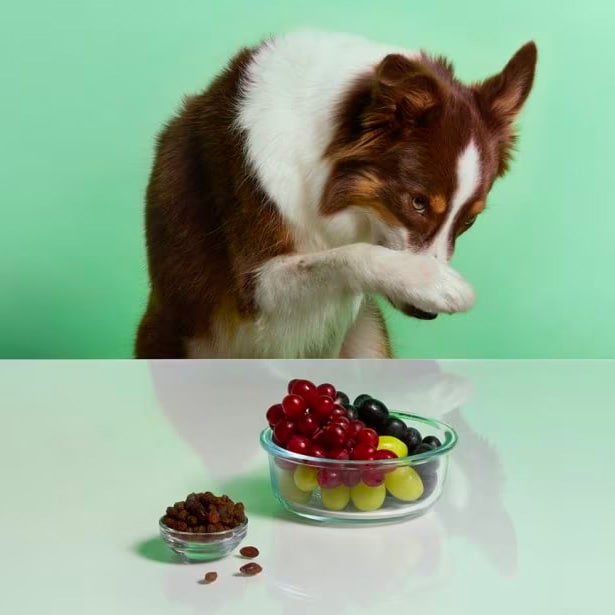
Grapes and raisins can cause acute kidney failure in some dogs, though research has yet to determine exactly which substance in the fruit causes this reaction or why it only happens in some dogs, explains Dr. Fiorenza.
“I recommend that clients do not feed their pets grapes or raisins under any circumstances, and that they treat it as a poisoning if ingestion occurs,” says Dr. Fiorenza. “Veterinary care should be sought immediately.”
Learn more about dogs and grapes and raisins.
6Stone Fruits
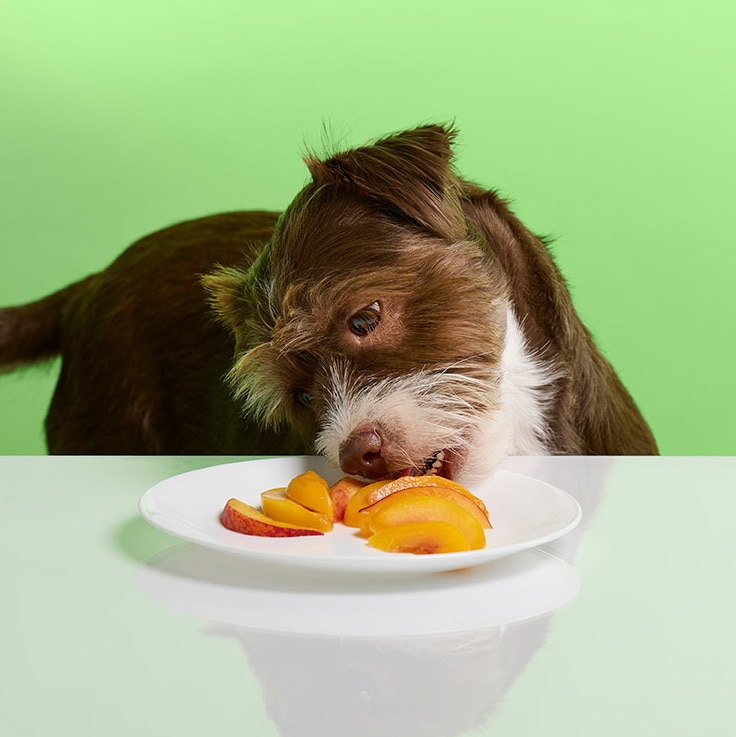
Stone fruits such as cherries, plums, apricots and peaches pose a two-fold risk to dogs: First, the pits contain cyanide, a potent poison that—when cracked open and consumed—can cause rapid breathing, excessive panting, dilated pupils and shock. Second, swallowing the pits can lead to choking or obstruction of the gastrointestinal tract.
The fleshy parts of these fruits are generally OK for dogs to consume, but it’s safest to avoid them altogether, as consuming even a small piece of the pit can be harmful.
7Nuts
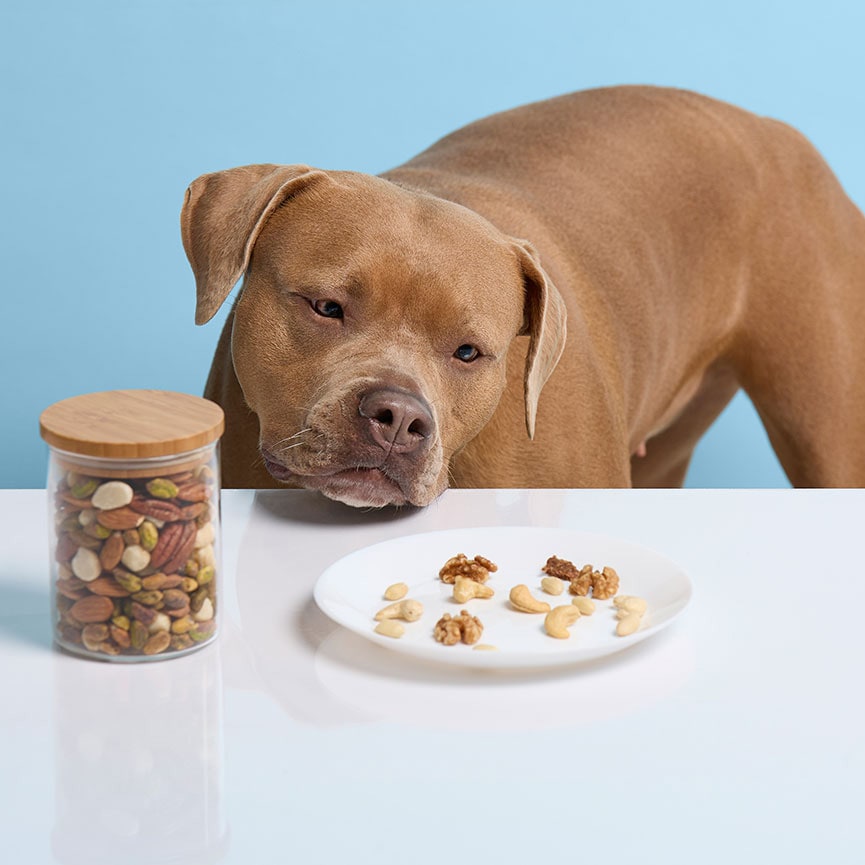
In general, nuts aren't a good snack for dogs. Their high fat content can lead to digestive issues, weight gain and pancreatitis when consumed in large amounts. Additionally, given dogs' tendency to gulp or gobble their food, whole nuts can present choking hazards or lead to intestinal obstructions.
Specific nuts pose even greater threats:
- Both macadamia nuts and black walnuts harbor compounds that are toxic to dogs. The toxic compounds within these nuts are unknown, but it takes only a few nuts to endanger a small- to medium-size dog. Ingesting these nuts can result in symptoms like vomiting, muscle weakness, tremors, fever and seizures.
- Almonds are also off limits.
Other nuts, like peanuts and cashews, can be given very occasionally in small amounts (1-2 nuts). Just be sure they are plain (no salt, garlic seasoning, etc.).
8Baked Goods
Many baked goods contain xylitol, which can cause low blood sugar in dogs.
Moreover, baked goods are often high in fat and sugar, which can contribute to upset stomach, obesity and pancreatitis in dogs.
9Raw Meat and Raw Eggs
Raw meat and eggs aren’t inherently toxic but can contain bacteria, like Salmonella or E. coli, which can cause food poisoning. Symptoms may appear 6-72 hours after eating the contaminated food and include vomiting, diarrhea, loss of appetite, lethargy, abdominal pain and fever.
Additionally, raw eggs contain avidin, an enzyme that decreases the absorption of biotin, which can lead to skin and coat problems.
10Yeast Dough and Raw Bread Dough
Yeast dough and raw bread dough are bad news for dogs. The dough can expand in your dog’s stomach, causing potentially fatal stomach bloating (aka gastric dilatation-volvulus).
To make matters worse, as the yeast ferments in your dog’s gut, it produces ethanol (alcohol) as a byproduct, which can lead to alcohol poisoning.
Learn more about dogs and sourdough bread.
11Alcohol
Many dogs have a sweet tooth and might be attracted to sweet alcoholic drinks, like spiked eggnog. But dogs should never partake in drinking alcohol.
Because dogs are much smaller than humans, alcohol affects them much more severely. Even consuming a small amount can lead to alcohol poisoning, with effects ranging from lack of coordination and drowsiness, to breathing difficulties and death.
12Chocolate, Coffee and Caffeine
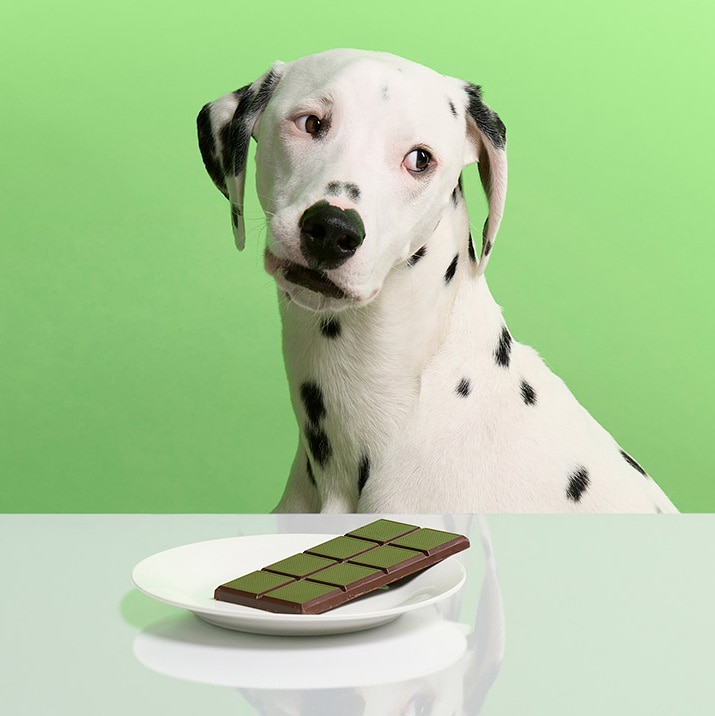
Chocolate—whether it’s milk, dark, bittersweet, white or ruby chocolate—contains ingredients that can be toxic to dogs. The two ingredients of concern—theobromine and caffeine—can cause stomach upset in smaller doses, and heart problems, seizures and even death in higher doses, Dr. Fiorenza says.
Other caffeine-containing beverages such as coffee, caffeinated tea and energy drinks should also be avoided.
Learn more about dogs and chocolate.
13Corn on the Cob
While the corn itself isn’t harmful, the cob poses a significant risk.
“Many dogs have eaten a yummy-smelling corn cob and gotten an intestinal blockage that requires surgery to remove,” says Dr. Fiorenza.
If you want to occasionally treat your dog to a small amount of corn, remove the cob and make sure the corn is served plain.
Learn more about dogs and corn.
14Salty Foods
High levels of salt can cause excessive thirst and urination in dogs and, in severe cases, sodium ion poisoning.
Some foods that pack a big salt punch include:
- chips
- crackers
- salted nuts
- cured meats and fish
- marinated foods
- canned or frozen entrées
Symptoms of excessive salt intake may include vomiting, diarrhea, tremors, high temperature and seizures. In some cases, excessive salt consumption can be fatal.
If your dog has consumed one of the above foods, call your veterinarian for guidance, or take them to the nearest veterinary or pet emergency clinic. You can also call the ASPCA Pet Poison Control Center at (888) 426-4435 for advice or get timely advice from our licensed veterinary team and leave with a personalized consult report by clicking into Chewy's Connect With a Vet live online chat program.
While these foods are off limits, there are many human foods you can occasionally treat your dog to. View our full list of human foods dogs can eat.
Looking for ready-to eat treats that dog can enjoy (in moderation, of course)? Shop treats on Chewy.
Dogs Can Eat These Human Foods, Though:
Share:




